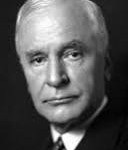Herbert Hoover (1874-1964), the 31st president of the United States, spoke out for U.S. aid to Jewish refugees in the 1930s and 1940s.
A mining engineer by profession, Hoover’s path to the 1928 Republican presidential nomination was paved by his leadership of food relief efforts that saved millions from starvation in Europe during and after World War I. Major Jewish communities were among those he aided. During the 1928 campaign, his American Jewish supporters distributed a pamphlet, in Yiddish and English, calling him “the modern Moses of war-stricken Europe [who] led Israel out of the slavery of starvation and despair.” However, by the time he ran for president, most American Jews had moved into the Democrats’ camp, and Hoover received only about 28% of the Jewish vote.
Shortly after Adolf Hitler’s rise to power in Germany, in early 1933, Jewish leaders asked president-elect Franklin D. Roosevelt and Hoover to issue a joint statement deploring the mistreatment of German Jewry. Hoover agreed to do so; Roosevelt declined. Before leaving office, Hoover instructed the U.S. ambassador in Germany, Frederic Sackett, “to exert every influence of our government” on the Hitler regime to halt the persecutions.
In 1930, in response to the Great Depression, then-president Hoover had tightened the requirements for new immigrants, by instructing consulates abroad to disqualify any applicant they deemed “likely to become a public charge.” At the time, there was no significant body of foreign nationals clamoring for haven from religious or ethnic persecution. Soon after Roosevelt took office, large numbers of German Jews began seeking permission to immigrate. FDR declined to rescind the 1930 edict.
During a visit to Europe in early 1938, Hoover met with Hitler. Their talk focused on
German domestic issues. Hoover acknowledged what he called the “hopeful, live atmosphere” in the country and the government’s achievements. Hitler, appealing to one of Hoover’s chief concerns, spoke at length about the threat that Communism posed to Germany and the rest of Europe. There was a flashpoint of tension when Hitler defended his totalitarian actions, and Hoover replied with a defense of “spiritual and intellectual freedom” and criticism of Germany’s imposition of “restrictive measures.”
Speaking in New York City later that month, the former president said that while in the realm of “material things,” the German people were “today better off than five years ago,” the Nazis were taking actions that no “lover of human liberty” could accept, including “suppression of all criticism and free expression”; “drilling children and youth, stage by stage, to a governmentally prescribed mental attitude”; “a controlled press and organized propaganda”; the elimination or control of “every form of independent association from trade unions to universities”; the establishment of “concentration camps”; and “its darkest picture…the heart-breaking persecution of helpless Jews.”
Hoover publicly endorsed the 1939 Wagner-Rogers bill to permit 20,000 German (Jewish) children to enter the United States outside the quota system. He also assisted the sponsors of the bill behind the scenes, by pressuring wavering members of the House Immigration Committee to support the measure. The endorsement of the only living former president gave the bill a significant boost. His stance ran counter to his political interests, since he hoped to win the GOP presidential nomination in 1940, and most Republicans opposed increased immigration.
In a discussion about the Wagner-Rogers at a meeting of the President’s Advisory Committee on Political Refugees, chairman James McDonald proposed “that Mr. Herbert Hoover might assume leadership in raising funds and in administering the work of placing the children in suitable homes.” Rabbi Stephen S. Wise, a member of the committee, insisted there be no contact with Hoover unless the State Department consented. As a result, McDonald first broached the suggestion with State Department official Theodore Achilles, who strongly opposed it, effectively burying the idea.
While most Republicans favored isolationism, Hoover took a more moderate approach, which he called “positive neutrality,” based on the principle that “neither isolation nor intervention [are] possible or wis[e].” He repudiated the extremist America First movement. Hoover opposed the Roosevelt’s proposed Lend-Lease program to assist England against the Germans, but he did support giving the British “the tools, and even warships, without our sending our boys to death.”
In a number of addresses in 1939, Hoover urged Americans to reject the “intolerant ideologies” and “old world ideologies” that were plunging the world into war. The examples of military aggression he cited indicated he was referring to Communism, Nazism, and Japanese nationalism. Nonetheless, Hoover’s remarks prompted a sharp denunciation from Rabbi Wise, who said “any American who considers the war in Spain [between fascists and communists] and the [Nazi] invasion of Austria wars of old word ideologies has ceased to be an American.”
During the Holocaust years, Hoover on several occasions associated himself with the activist Bergson Group. He served on the Sponsoring Committee of Bergson’s protest pageant, “We Will Never Die.” He was also honorary chairman of Bergson’s July 1943 Emergency Conference to Save the Jewish People of Europe and addressed the event via live radio hook-up.
Hoover played a significant role in the decision to include a plank in the 1944 Republican Party platform urging the rescue of Europe’s Jews and supporting Jewish statehood in Palestine. It was the first time in American history that either major political party took such stands, and it forced the Democrats to adopt similar language at their convention later that year.
Sources: Wentling and Medoff, Herbert Hoover and the Jews, pp.64-65, 70-71, 77-78, 87, 100-101, 129-34;
Wyman and Medoff, A Race Against Death, pp.125-126.











